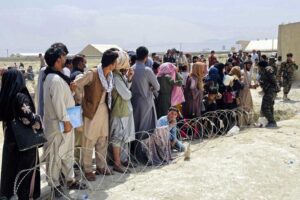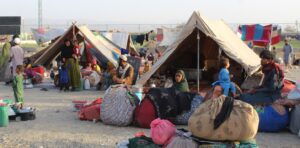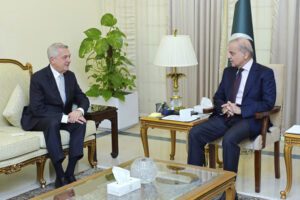The head of the United Nations refugee agency, Filippo Grandi, met with Pakistan’s Prime Minister Shabaz Sharif to address the critical situation of Afghan refugees following Islamabad’s stringent anti-migrant measures. This high-level discussion comes at a time when over 500,000 Afghan refugees face an uncertain future in Pakistan, grappling with the aftermath of recent forced expulsions.
Prime Minister Shabaz Sharif reassured Filippo Grandi of the UNHCR about Pakistan’s commitment to treating Afghan refugees with respect and dignity, despite the challenges posed by the anti-migrant crackdown. The meeting focused on the need for a collaborative approach to manage the refugee crisis and ensure their safe and dignified repatriation.
Background and Current Situation
Pakistan has a long history of hosting Afghan refugees, dating back to the Soviet occupation of Afghanistan from 1979 to 1989. This hospitality continued following the Taliban’s takeover in 2021. Currently, Pakistan hosts an estimated 1.7 million Afghan refugees. The recent crackdown, however, has forced approximately 600,000 Afghans to return to their homeland, raising significant human rights concerns.

Key Questions and Answers
1. What is the historical context of Pakistan hosting Afghan refugees?
Pakistan has been a refuge for Afghan nationals since the Soviet invasion in 1979, continuing to offer asylum through various conflicts, including the recent Taliban resurgence. This historical backdrop underscores Pakistan’s long-term commitment to supporting Afghan refugees despite domestic challenges.
2. What triggered the recent anti-migrant measures in Pakistan?
The crackdown primarily targets individuals without valid documentation, irrespective of nationality. This initiative is part of Pakistan’s broader effort to manage its security and demographic challenges, although it has faced substantial criticism for its harsh implementation.
3. How is the international community responding to the forced expulsions?
UN agencies have condemned Pakistan’s actions, highlighting potential severe human rights violations such as family separations and the deportation of minors. There is a call for a collective international effort to support Pakistan in managing this crisis responsibly.
4. What are the security implications of the refugee situation for Pakistan?
The presence of Afghan refugees and the recent expulsions have exacerbated security issues in Pakistan, particularly with the rise in militant attacks attributed to the Pakistani Taliban, an ally of the Afghan Taliban. These attacks strain Pakistan-Afghanistan relations and pose significant internal security threats.
Statements from the Meeting
During the meeting, Prime Minister Sharif emphasized the respectful treatment of Afghan refugees despite the ongoing challenges. He urged the international community to acknowledge and support Pakistan’s efforts, stating, “Afghan refugees were treated with exemplary respect and dignity.”
Filippo Grandi highlighted the resilience of Afghan refugees and Pakistan’s longstanding hospitality, noting, “The resourcefulness of Afghan refugees is a testimony to their strength and Pakistan’s long hospitality.”
Future Steps and International Collaboration
Sharif called for increased assistance from the UNHCR to facilitate the safe and dignified repatriation of Afghan refugees. Additionally, discussions with Asif Durrani, Pakistan’s special representative for Afghanistan, reaffirmed the commitment to finding durable solutions to the refugee crisis.
The situation of Afghan refugees in Pakistan remains a complex humanitarian issue with significant security and diplomatic implications. The recent high-level meetings underscore the need for a concerted international effort to support Pakistan and ensure the well-being of Afghan refugees. As the global community watches, the hope is for a collaborative approach that balances security concerns with humanitarian obligations.
“This project plays a crucial role in Pakistan’s energy security and economic development. As we inaugurate this significant part of the project, we also celebrate the joint efforts that brought us here. From hardworking engineers and dedicated workers to our esteemed partners and supporters, your collective contribution has been invaluable.” – Filippo Grandi, UNHCR.

Key Points
- Historical Context: Pakistan’s role in hosting Afghan refugees since 1979.
- Recent Measures: The impact of Pakistan’s anti-migrant crackdown.
- International Response: UN’s condemnation and calls for collaborative efforts.
- Security Implications: Increased militant attacks and strained Pakistan-Afghanistan relations.
- Future Steps: Emphasis on safe repatriation and international support.
This comprehensive approach ensures that the refugee crisis is managed with a blend of security measures and humanitarian support, highlighting the resilience of Afghan refugees and the longstanding hospitality of Pakistan.
Related stories:
Pakistan to Begin Second Phase of Afghan Deportations
Pakistan Extends Stay for Undocumented Afghans, Urgency Mounts Amid Resettlement Delays

















